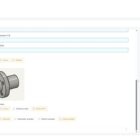AI is not the future of CPQ, it is the present
Artificial Intelligence is shaping industries from engineering and communication to healthcare, finance, and manufacturing. While its influence extends across countless fields, our focus is on its transformative impact in engineering and manufacturing.
Across all new CPQ portals and industry discussions, one thing is certain: Artificial Intelligence is the hottest topic. Manufacturers that want to stay competitive are already integrating AI-driven CPQ solutions to enhance their sales cycle, quotation accuracy, documentation management, and, most importantly, customer experience. The impact is clear, AI is transforming how companies configure, price, and quote by providing real-time insights, optimizing pricing strategies, and streamlining the sales process like never before.
The benefits of CPQ automation are clear. Tacton, the two-time leader in Gartner’s Magic Quadrant for CPQ, reports that companies using CPQ experience a 45% increase in profit, driven by an 8% higher win rate per quote and an 11% increase in the number of quotes generated per year. By streamlining quoting processes and reducing inefficiencies, CPQ ensures faster order conversions and optimized pricing strategies. Additionally, companies benefit from significant cost savings, including a 40% reduction in new sales rep training time and a 34% decrease in time spent on quotes, allowing sales teams to focus on closing more deals. As we move into 2025, AI will be the most significant trend in CPQ, pushing automation to new levels and ensuring that manufacturers not only stay relevant but thrive in an increasingly competitive landscape.
AI has been a key topic at Scandinavian Digital for some time, particularly in its role in enhancing CPQ solutions like Tacton. Tacton CPQ distinguishes itself in the space of AI-driven automation by offering manufacturers a comprehensive suite of intelligent tools. One of its standout features is intelligent quotation and proposal generation, which leverages AI-driven predictive analytics to create personalized quotes and proposals aligned with each customer’s unique preferences and buying behaviour. This automation reduces administrative tasks for sales teams, allowing them to focus on building relationships and closing deals.
Furthermore, Tacton’s seamless integration capabilities enhance its AI automation prowess. The platform effortlessly connects with enterprise applications, databases, and services without the need for coding, thanks to its REST APIs. This system-agnostic approach ensures smooth data flow across various systems, including CRM, ERP, PLM, and PIM, fostering collaboration and unifying operations. Such integrations enable real-time data synchronization, optimizing sales strategies and enhancing overall business performance.
AI in CPQ is a topic that will be widely discussed because there is simply no way to avoid it. As manufacturers push for greater efficiency, precision, and automation, Symbolic AI stands out as a transformative innovation—delivering 100% accuracy based on rules and constraints, ensuring error-free configurations, optimized pricing, and seamless sales processes. Unlike traditional AI models that rely on probabilities, Symbolic AI operates on strict logical rules, making it the most reliable approach for complex manufacturing. This shift is already happening, and as AI continues to reshape CPQ, the conversation around its impact will only grow stronger. Manufacturers that embrace it now will lead the market, while those who wait risk falling behind.







